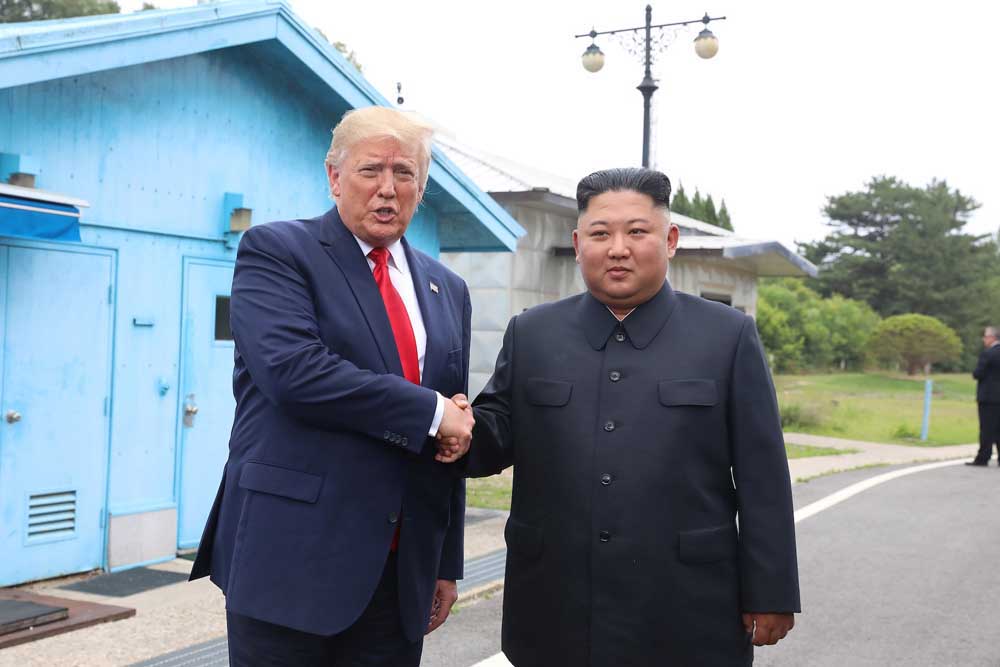Commentary: Can Trump persuade North Korea to return to the negotiating table?
Published 9:00 pm Monday, February 10, 2025

- North Korean leader Kim Jong Un and U.S. President Donald Trump shake hands inside the demilitarized zone separating the South and North Korea on June 30, 2019 in Panmunjom, South Korea.
During a recent interview with Fox News host Sean Hannity, President Donald Trump stated that he would reach out to North Korean leader Kim Jong Un again in his second term to mitigate security threats.
This was not the first time Trump expressed his intention to reopen diplomacy with North Korea since taking office. On his first day in office, he notably referred to North Korea as a nuclear power for the first time. By acknowledging North Korea as a nuclear-armed state, Trump appeared hopeful that Kim Jong Un would be willing to engage in talks with him once more.
This may be wishful thinking on Trump’s part.
While Trump’s remarks may have pleased Kim, they are unlikely to be enough to change Kim’s stance. Kim Jong Un stated last November, “We have exhausted all our diplomatic options to create peace with the U.S.,” and declared that there would be no new summit meetings with any American president.
More importantly, with Russian President Vladimir Putin now aligned with him, Kim Jong Un feels less need for a security guarantee from Trump than he did before and will not seek Trump’s recognition of his country’s nuclear capabilities.
Last June, Kim Jong Un established a mutual defense pact, which guarantees Russia’s military assistance if North Korea faces armed aggression. In accordance with this pact, Kim deployed his special forces to the Kursk region in Russia. He is assisting Putin in countering the Ukrainian incursions into Russian territory, and in return, Kim Jong Un expects similar support from Putin.
Trump has often stated that he has a strong relationship with Kim, believing that this connection will help prevent military provocations from North Korea. However, Trump’s friendship with Kim Jong Un alone will unlikely change Kim’s aggressive behavior. For instance, shortly after Trump’s interview with Fox News, Kim Jong Un conducted tests of sea-to-surface strategic cruise missiles, signaling a hardline stance against Washington, D.C.
To bring Kim Jong Un back to the negotiating table, Trump must provide what Putin’s support for the Kim regime lacks. The U.S. has successfully helped many impoverished and nondemocratic countries, such as China, Vietnam and Singapore, develop their economies. Therefore, if the U.S. assists North Koreans in overcoming poverty, Kim Jong Un would greatly appreciate Trump’s efforts.
The good news is that Trump does not need to spend American tax dollars to show goodwill toward North Korea’s supreme leader. He can let South Korea, the fourth largest economy in Asia and the 12th largest in the world as of 2024, assist on behalf of the U.S.
In the early 2000s, the U.S. did not oppose economic cooperation between North and South Korea. South Korea was authorized to establish the Kaesong Industrial Zone (KIZ), a special administrative region in North Korea. Located just 6 miles north of the Korean Demilitarized Zone and an hour’s drive from Seoul.
However, former conservative President Park Geun-hye unilaterally closed the KIZ after condemning Kim Jong Un for his ongoing military provocations, including a spy satellite launch and conducting a hydrogen bomb test. If Trump persuades the two Koreas to reopen the KIZ, Kim Jong Un will view it as the start of a new chapter in diplomatic relations with the U.S. All Trump needs to do is give the green light. Once the Koreas receive his approval, they will utilize their financial and material resources to restart their economic cooperation.
Trump should ensure that all manufactured goods produced by South Korean companies at the KIZ are classified as made-in-Korea products. In the past, the U.S. did not guarantee this for South Korea. As a result, South Korean companies could not benefit from exporting KIZ products because they could not take advantage of the preferential low tariffs offered by the U.S.
If Trump officially declares KIZ products as made-in-Korea, it would further encourage South Korea to enhance its economic interactions with the North, thereby prompting the latter to promote peaceful coexistence with the former.








